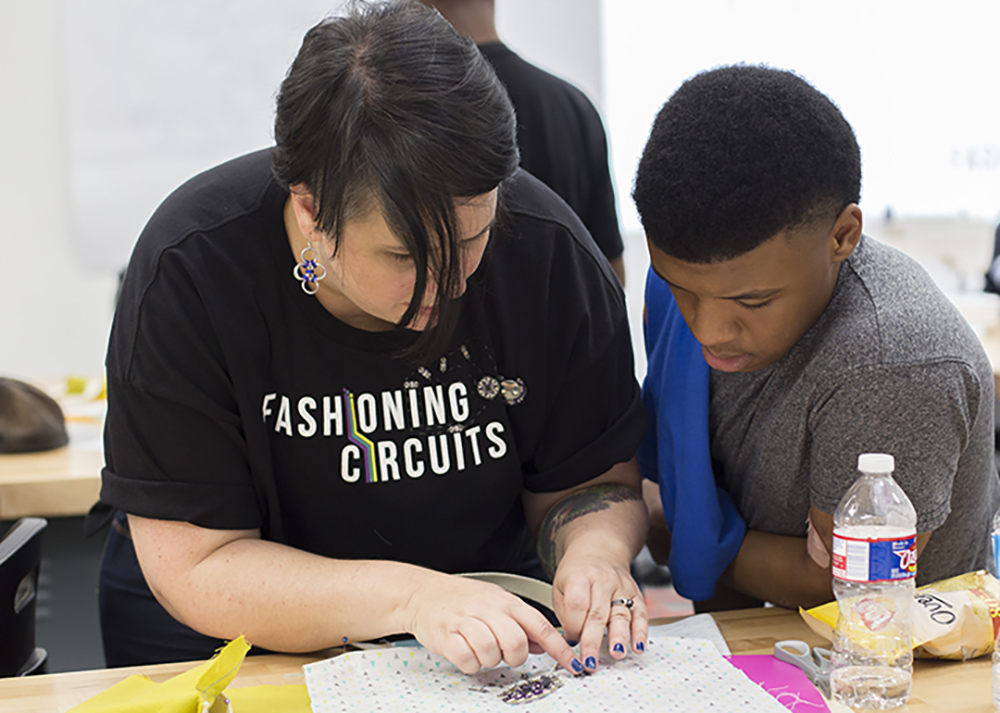
Dr. Kim Knight
Dr. Kim Knight, an assistant professor of emerging media and communication, has received the 2016 Regents’ Outstanding Teaching Award for her work and innovation in the classroom.
Knight has been a professor at UT Dallas since 2010, but her first foray into teaching was more than 14 years ago at California State University, Northridge as a teaching assistant under the tutelage of English professor Dr. Irene Clark.
It was there that Knight learned many of the strategies she still uses today.
“From the very beginning, Dr. Clark helped me frame the classroom as a space that should place students and their thinking at the center,” Knight said. “The classroom is a space where students arrive with a variety of experiences and learning styles; where their work is process-based and broken down into small steps with opportunities to revise and improve; and as a space with political and social dimensions that cannot be ignored.”
Knight received her bachelor’s and master’s degrees in English literature from Cal State Northridge, and she said her interest in new media and digital technology stems, in part, from her love of science fiction and fantasy literature.
“It wasn’t much of a stretch to go from literature about technology to writing that used digital technology,” she said. “As a first-generation college student, I was excited by the empowering aspects of networked technologies and their potential for opening up access, promoting amateur production, flattening hierarchies, and creating a more just and equitable world. My interest is in studying new media in all of its facets so that we can fulfill those promises.”
Knight’s work at UT Dallas focuses on how these objectives intersect with issues in new media such as privacy, ownership and diversity.
As an inherently dynamic subject, new media and technology can have its challenges for teachers, but Knight said what’s most exciting about the field is that working scholars and students are helping to define it.
“And yet, it resists ever being fully defined,” she said. “It also means that you can never keep up with everything that is developing on a daily basis. This affords the rich opportunity to invite students to bring their own knowledge of those developments into the classroom.”

Dr. Kim Knight leads a Fashioning Circuits workshop at a STEAM-focused summer camp at Eastfield College. (Photo by Lauren Shafer)
Some of her most popular courses touch on viral media, writing in digital spaces and understanding how text, image and sound are used in digital spaces.
She said her favorite course to teach is Fashioning Circuits, which also serves as a research blog and digital humanities project.
“The grounding in social and cultural theory helps students understand the scholarly implications of something that some assume is a frivolous topic: fashion,” she said. “Fashion is about bodies and about culture. When you connect it to technology, it helps to make explicit that technology is also about bodies and culture.”
The course, which usually has a few students who don’t consider themselves creative or coders at the beginning, is an opportunity to explore the expressive possibilities of sewing, coding and electronics as media, she said.
The project also works with community partners to develop programming to introduce nonprogrammers to coding in a humanities aspect.
Knight, who received her PhD in English from the University of California, Santa Barbara, said her goal is to help her students develop into well-rounded and educated citizens who are ready to be critical participants in a democratic society.
“If I focus on helping students understand one technological platform, it does not serve them well,” she said. “Instead, it is important to help them develop an understanding of how technology, community, power and communication intersect so that they can ethically engage with the technology of tomorrow, regardless of what form that takes.”